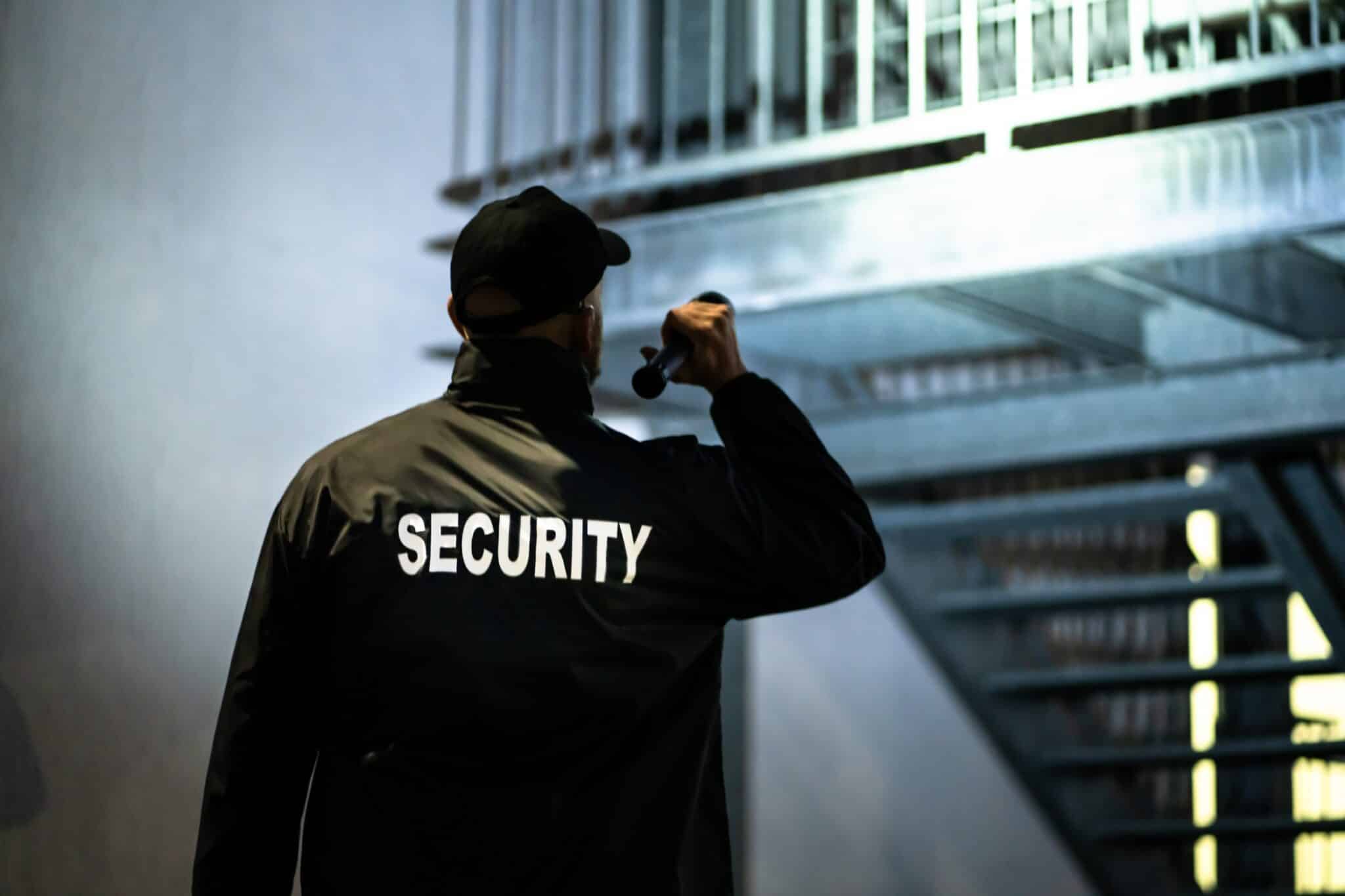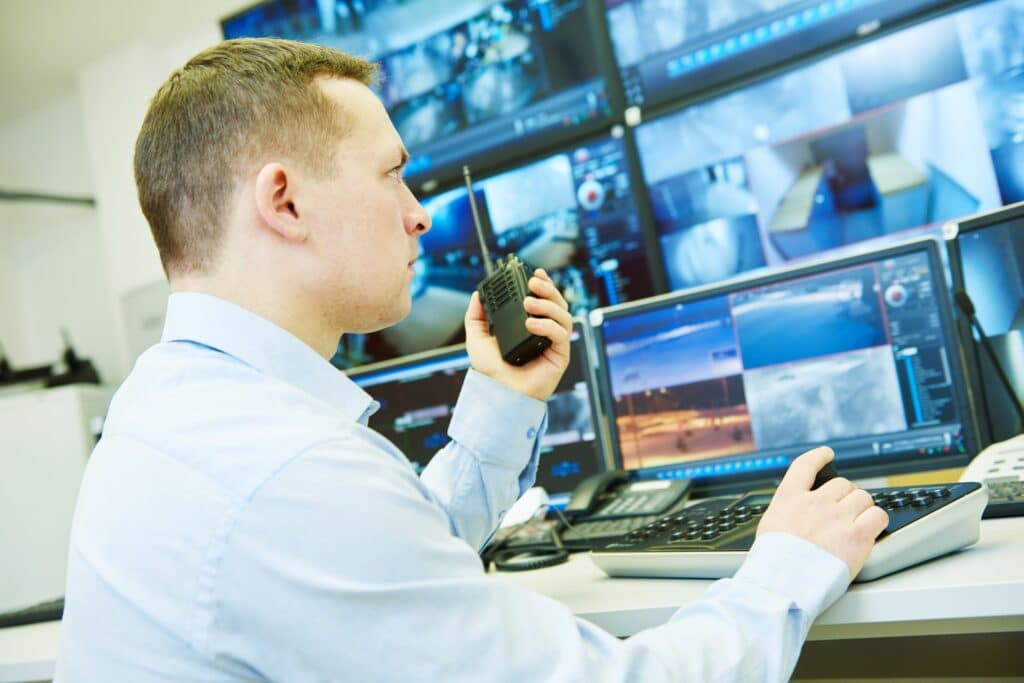The traditional on-site security guard model faces competition from an innovative approach: remote security guards. These virtual security professionals leverage video surveillance and the internet, to watch your property from afar. They’re the eye in the sky we need to keep businesses safer.
The shift from traditional on-site guards to remote guards is driven by technology, changes in workplace dynamics, and the demand for more effective security solutions. This blog will explore why remote security guards might be even better than on-site guards.
Remote Security Guards vs. On-Site Guards: Which is better?
Human security guards create a live presence at your business. It’s a traditional approach to security. However, over the past decade, new tools have emerged that replace this on-site workforce with video surveillance monitored by off-site personnel. These models are growing in popularity because they are less costly and more effective that a traditional security presence. In a time of chronic labor shortages, security footprints can stretch farther with fewer guards using technology. What are the benefits of remote security guards over on-site staff?
-
Cost-Effectiveness
One of the most compelling reasons to consider remote security guards is cost-effectiveness. Hiring, training, and maintaining on-site security personnel is expensive. In addition to salaries, there are costs associated with benefits, uniforms, equipment, and training. Remote security solutions use video technology to monitor multiple sites simultaneously, reducing the need for a large on-site security staff. It's a great model that cuts labor costs and minimizes overhead expenses.
-
24/7 Surveillance
Remote security guards equipped with video surveillance can provide continuous monitoring around the clock. On-site guards work shifts and could miss critical events during handovers or breaks. Remote security personnel provide uninterrupted surveillance. Continuous monitoring maintains a high level of security for promptly responding to any possible incidents.
Enhanced Coverage and Visibility
Remote security systems integrate multiple cameras placed strategically around a property. They can cover blind spots that an on-site guard might miss. With advanced video analytics, remote guards can monitor large areas more effectively than a single on-site guard. High-resolution cameras and sophisticated software can detect unusual activities, track movements, and identify potential threats before they escalate.
Rapid Response and Coordination

-
Reduced Risk to Personnel
On-site security guards are often in harm's way. They face potential threats from intruders or hazardous situations. Remote security guards operate from a secure location. It reduces their risk of physical harm and ensures their safety. This arrangement also allows them to focus on monitoring and responding to incidents without the distraction of personal safety concerns.
-
Scalability and Flexibility
Remote security solutions are highly scalable and flexible, ideal for businesses of all sizes. Whether you have a small retail store or a large industrial complex, remote security systems can be customized to meet your needs. As your business grows, additional cameras can be easily added without hiring more on-site guards. Scalability ensures that your security infrastructure can evolve with your business.
-
Advanced Technology Integration
Modern remote security systems offer advanced technologies such as artificial intelligence (AI), machine learning, and video analytics. These technologies enhance the capabilities of remote guards by automating routine tasks, such as recognizing license plates, detecting motion, and identifying suspicious behavior. AI-powered analytics provides insights into patterns and trends, helping to prevent incidents before they occur. By leveraging these advanced technologies, remote security guards can offer higher protection and more proactive security measures.
-
Better Resource Utilization
Remote security guards can monitor multiple locations from a central hub, making it possible to oversee several properties simultaneously. This efficient use of resources lets businesses maintain security across multiple sites without on-site guards.
-
Enhanced Privacy and Confidentiality
Remote security guards operate from a separate location, enhancing sensitive on-site operations' privacy and confidentiality. Employees and visitors may feel more comfortable knowing security personnel are not physically present. Confidentiality can be important in environments where privacy is a priority, such as healthcare facilities or corporate offices.
Consider Remote Security in Your Business
For many years, on-site security guards have been a cornerstone of physical security. However, the time has come to work smarter with remote security guards. Video surveillance offers a compelling alternative to the cost and risks associated with on-site security.
Pro-Vigil offers remote security guard services that offer all the benefits with none of the risks. This service is perfect for businesses hoping to optimize their security infrastructure, without the high cost of on-site guards. We offer these businesses a way to capitalize on modern technology to improve their security footprint. Talk with our team today about your options.
Q&A
Using live on-site guards comes with several risks. Physical safety is a primary concern. Guards can face direct threats from intruders, potentially leading to injury—or worse. Human error is another risk. Guards can become tired, distracted, or may miss critical details. Employing on-site guards can be expensive due to salaries, benefits, and training expenses. There is also the potential for liability issues if a guard's actions lead to harm or legal disputes. Finally, live guards may struggle to cover large areas effectively, leaving blind spots in security coverage.
A virtual security guard monitors properties remotely using advanced video surveillance systems. They oversee multiple locations from a centralized hub, leveraging high-resolution cameras and video analytics to detect suspicious activities. Virtual guards respond to real-time alerts, assessing situations and coordinating responses with on-site personnel or local authorities. They can communicate with intruders on-site through intercom systems, provide guidance during emergencies, and log incidents for documentation and analysis. Utilizing AI and machine learning, virtual security guards enhance threat detection and ensure continuous, efficient monitoring.







